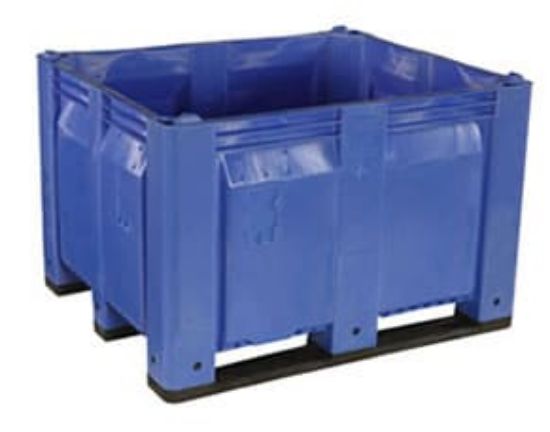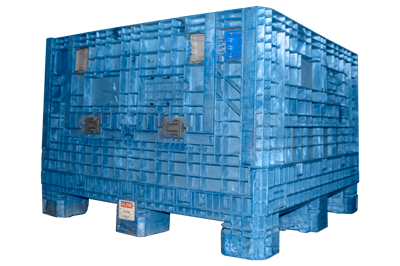How used bulk containers improve storage efficiency across industries
The Ultimate Overview to Choosing the Right Mass Containers for Your Business Needs
Selecting the proper bulk containers is essential for any business that depends on effective logistics. Various kinds of containers exist, each designed for specific products and applications. Elements such as size, material compatibility, and regulative criteria play a considerable role in this decision-making procedure. Recognizing these components can bring about improved functional efficiency. Numerous businesses neglect essential facets that can boost their total performance and sustainability. What are these considerations?
Comprehending Different Kinds Of Bulk Containers
Bulk containers work as essential devices for businesses looking for effective storage space and transport options. These containers come in numerous kinds, each developed to meet particular functional requirements. One common kind is the intermediate bulk container (IBC), which is suitable for fluid and granulated materials, supplying an equilibrium of capability and maneuverability. An additional prominent alternative is the mass bag, or FIBC, appropriate for dry, flowable items. These flexible containers are lightweight and can be quickly transported and saved. For heavier materials, rigid mass containers are usually used, giving durability and stability for risk-free handling. Additionally, there are specialized containers customized for dangerous materials, ensuring compliance with security regulations. Recognizing the distinctive characteristics of these mass container kinds enables organizations to make educated decisions that maximize logistics and minimize expenses. By choosing the right container, business can boost their functional efficiency and streamline their supply chain processes.
Key Material Factors To Consider for Mass Containers
When selecting bulk containers, it is important to ponder the products utilized in their construction. Variables such as resilience, chemical, and stamina compatibility play an essential role in guaranteeing the containers fulfill certain operational needs. Furthermore, weight and transportability problems can impact both efficiency and transportation logistics.
Product Resilience and Strength
Durability and stamina are important consider choosing materials for mass containers, as they straight influence the container's capacity to endure numerous environmental problems and managing processes. Products such as high-density polyethylene (HDPE), polypropylene, and stainless steel are commonly favored for their robust residential properties, providing resistance to temperature, abrasion, and influence fluctuations. The selection of product likewise influences the overall life expectancy of the container; more powerful materials typically cause less regular replacements, leading to cost financial savings over time. Furthermore, the weight of the product can impact delivery expenses and ease of handling. Services need to consider their certain operational settings and the potential for deterioration to assure peak longevity and toughness in their mass container option.
Chemical Compatibility Aspects
Comprehending chemical compatibility is crucial for choosing mass containers, as the materials utilized have to resist the details compounds they will certainly hold. Numerous aspects influence compatibility, consisting of the chemical nature of the components, temperature level, and duration of storage. Corrosive chemicals may need containers made from stainless steel or specialized plastics that resist degradation. In addition, reactive materials can create warmth or gases, requiring vented or pressure-rated containers. The selection of container product, whether metal, polyethylene, or polycarbonate, ought to straighten with the chemical buildings of the stored compounds to stop violations or leaks. Inevitably, a thorough analysis of these compatibility elements ensures risk-free handling and storage, safeguarding both workers and the setting while maintaining item stability.
Weight and Mobility Problems
Picking bulk containers involves not just evaluating chemical compatibility but additionally considering weight and mobility. Businesses need to evaluate the ease of handling and transportation to maximize performance. Lightweight products like high-density polyethylene (HDPE) or light weight aluminum can promote simpler movement and decrease shipping expenses. On the other hand, heavier containers may supply improved durability however can impede movement, especially in settings needing frequent relocation. Additionally, the layout of the container ought to allow for hassle-free training and piling, making certain ergonomic safety for workers. Companies need to also think about the infrastructure readily available for transport; for instance, containers compatible with forklifts or pallet jacks can enhance procedures. Eventually, the right balance between weight and transportability straight affects functional performance and expense efficiency.
Sizing Your Bulk Containers for Ideal Effectiveness
When sizing bulk containers, services must thoroughly analyze the dimensions required to accommodate their details products. Additionally, weight ability is a crucial aspect that affects efficiency and safety and security during transportation and storage. Efficient sizing not just takes full advantage of room yet additionally enhances functional process.
Identifying Container Capacities
Selecting the right measurements for bulk containers is essential for taking full advantage of efficiency in storage and transportation. Services should analyze their particular demands, taking into consideration elements such as readily available room, the nature of the products being kept, and the methods of transport utilized. Exact measurements ensure that containers fit preferably in vehicles and stockrooms, minimizing lost room and decreasing managing time. Requirement sizes can provide benefit, however customized measurements could be required for special requirements or to accommodate specific products. In addition, it is very important to review piling capabilities and accessibility, as these variables affect total functional efficiency. Inevitably, the ideal measurements result in enhanced organization and structured check here logistics, benefiting the general performance of business.
Weight Ability Considerations
Understanding weight ability is crucial for organizations aiming to optimize their mass container efficiency. The weight capacity of a container straight affects storage abilities, transportation logistics, and general operational costs. Choosing containers with the appropriate weight limitations ensures that organizations can securely store and transfer their products without risking damages or compliance problems. Straining containers can result in architectural failings, while underutilizing ability cause wasted resources. It is very important for services to analyze their product weights and take into consideration any kind of regulatory needs when picking containers. Additionally, factors such as the sort of material, intended usage, and ecological problems should additionally affect weight capacity decisions. By reviewing these components, businesses can improve efficiency and assure a structured supply chain.
Governing Compliance and Safety Specifications

Regulative compliance and security standards play a vital function in the selection of bulk containers for organizations. Organizations should assure that their containers satisfy various laws set by local, nationwide, and international authorities. These criteria frequently relate to product security, architectural honesty, and proper labeling, which help stop crashes and guarantee the secure transport of items.
In addition, adherence to industry-specific standards, such as those from the Fda (FDA) or the Occupational Safety And Security and Wellness Administration (OSHA), is vital for companies handling dangerous products or foodstuff. Non-compliance can result in penalties, lawful issues, or damages to an organization's track record.
Businesses should also consider the container's compatibility with the materials being kept or transferred to stay clear of contamination or chain reaction (used plastic containers). To summarize, understanding and executing regulative compliance and safety requirements is crucial for the reliable and accountable use bulk containers
Sustainability Options for Eco-Friendly Bulk Containers

Firms are likewise exploring options made from recycled products, which not just conserve sources however likewise sustain the reusing market. Furthermore, advancements in style permit lighter containers that require much less energy to transport, further boosting sustainability. By integrating these environmentally friendly mass container alternatives, services can demonstrate their commitment to environmental stewardship while satisfying customer demand for sustainable methods. This change not only assists the planet but can additionally improve brand name track record and consumer commitment.
Cost-Effectiveness and Budgeting for Mass Containers
While lots of services focus on sustainability, cost-effectiveness continues to be an important variable when selecting mass containers. Organizations has to assess the initial acquisition price, as well as lasting functional expenses, to guarantee financial feasibility. Factors such as reusability, upkeep, and toughness play a substantial duty in establishing overall expenses.
Investing in high-grade containers may yield higher ahead of time costs however can bring about cost savings with reduced substitute rates and decreased waste. Furthermore, companies must consider transport prices and storage efficiency, as these can affect the total budget plan.

Regularly Asked Concerns
Exactly how Do I Figure Out the Right Container for Hazardous Materials?
To determine the right container for hazardous materials, one must evaluate compatibility with the substance, think about the container's product, look for regulatory conformity, and analyze ability and safety and security functions to ensure proper handling and storage.
Can Mass Containers Be Customized for Details Products?
Yes, bulk containers can be personalized for particular items. used bulk containers. Numerous attributes, such as material, design, and dimension, can be customized to fulfill special requirements, making sure perfect security and efficiency for carrying and keeping different products
What Is the Typical Life Expectancy of Various Bulk Container Types?
The typical life-span of mass container types varies; plastic containers last 5-10 years, steel containers 10-20 years, and wooden containers usually last 3-7 years, relying on use, upkeep, and environmental conditions.
Just how Should I Clean and Maintain Bulk Containers?
To cleanse and maintain bulk containers, one must frequently examine for damages, remove deposit, clean with appropriate cleaning agents, rinse thoroughly, and guarantee correct drying out prior to storage. Following supplier standards boosts longevity and security during usage.
Exist Rental Alternatives for Mass Containers Available?
Yes, various firms offer rental alternatives for mass containers, supplying versatility for services. These rentals can fit various demands, enabling companies to take care of stock effectively without the commitment of purchasing containers outright.
Sturdiness and stamina are critical variables in choosing materials for mass containers, as they straight influence the container's ability to hold up against various ecological conditions and handling procedures. Comprehending chemical compatibility is necessary for selecting bulk containers, as the materials utilized must stand up to the particular substances they will hold. Comprehending weight ability is essential for businesses intending to maximize their bulk container efficiency. Regulatory conformity and security standards play an important function in the choice of bulk containers for services. While lots of companies focus on sustainability, cost-effectiveness remains an essential aspect when selecting bulk containers.